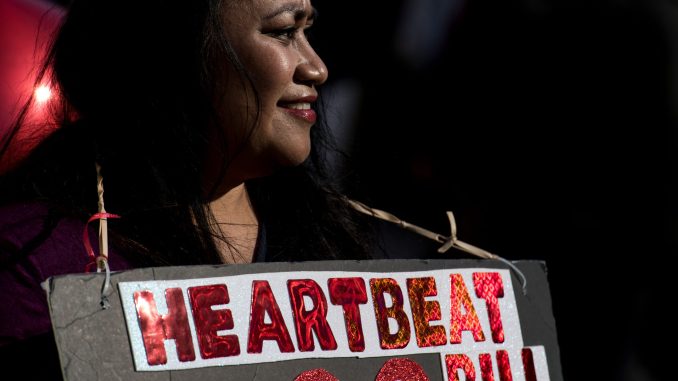
One of the Left’s favorite tactics for stifling debate about abortion is to claim pro-life men shouldn’t have an opinion about what women do with their bodies.
Nebraska state Sen. Merv Riepe was one of the co-sponsors of the Nebraska Heartbeat Act, so it’s clear he refuses to play the pro-abortion shame game. But like thousands of Nebraskan women each year, he faces a tough choice that involves life and death.
His bill would make it illegal for a physician to perform an abortion after a fetal heartbeat can be detected. That would mean abortions in Nebraska would be prohibited after about six weeks’ gestation.
He has since revised his position and introduced an amendment that would lower the existing ban from 20 weeks to 12, rather than six.
The truth is that a heartbeat bill is not radical. It’s a morally defensible position built on the belief that human life is valuable regardless of the circumstances of conception, income of the mother, age, or location (e.g., in the womb).
The Nebraska Heartbeat Act is the type of legislation that demonstrates life is worth protecting and preserving.
Several states, including New York and Illinois, have done the opposite by removing restrictions on abortion. One state delegate in Virginia proposed a bill in 2019 that would allow doctors to perform an abortion even if the mother showed signs of going into labor. Federal legislators have moved in a similar direction. House Democrats proposed a bill after Texas enacted its “heartbeat” ban that removed abortion restrictions after fetal viability.
The past 50 years of legal battles over abortion—starting with Roe v. Wade in 1973 and continuing since the Dobbs v. Jackson Women’s Health Organization decision last summer—prove every state will have to define what life is and when it should be protected.
But there’s another problem here, one that won’t be fixed through legislation. The Nebraska Department of Health and Human Services’ 2021 report on abortion found that nearly 40% of the state’s 2,360 abortions were due to not using contraception.
That’s what happens in a culture where abortion on demand is the norm and children are characterized as the unwanted “consequence” of sex, rather than the expected “fruit” of it. A state like Nebraska, with a large agricultural sector, should understand that better than most.
Nebraska has a chance to show the rest of the country that abortion policy can—and should—be nonpartisan.
Liberals should be able to acknowledge that intentionally taking an innocent human life is always wrong. Conservatives should continue caring for women dealing with an unplanned pregnancy, especially through their support for pregnancy resource centers.
Both sides of the political spectrum should also reiterate the benefits of marriage and family life. The entire state would benefit from an increase in the number of children growing up in loving, stable two-parent homes.
Every legislator in the country working on this issue should be reminded that defending the rights of the defenseless always requires courage.
The Nebraska Legislature is no different. The senators fighting for the Nebraska Heartbeat Act don’t have to look far for a rallying cry. Omaha Mayor Jean Stothert, a former nurse, summed it up perfectly in her endorsement of Riepe: “When life and limb are on the line, there’s no time for talking points. It’s time for action.”
I hope that a generation of future Nebraskans will appreciate the people who sprang into action to protect their lives.
Have an opinion about this article? To sound off, please email letters@DailySignal.com and we’ll consider publishing your edited remarks in our regular “We Hear You” feature. Remember to include the url or headline of the article plus your name and town and/or state.

